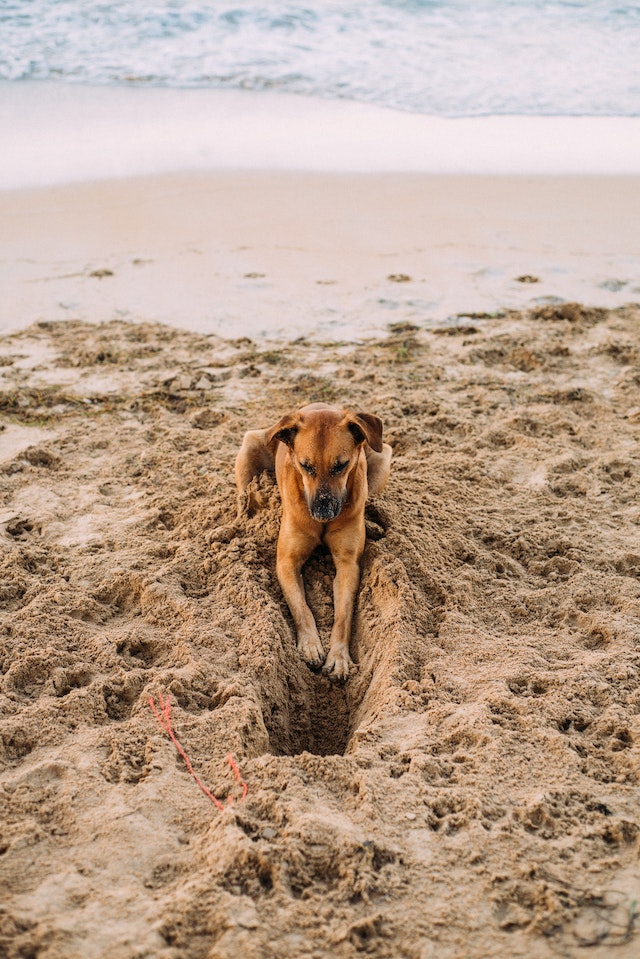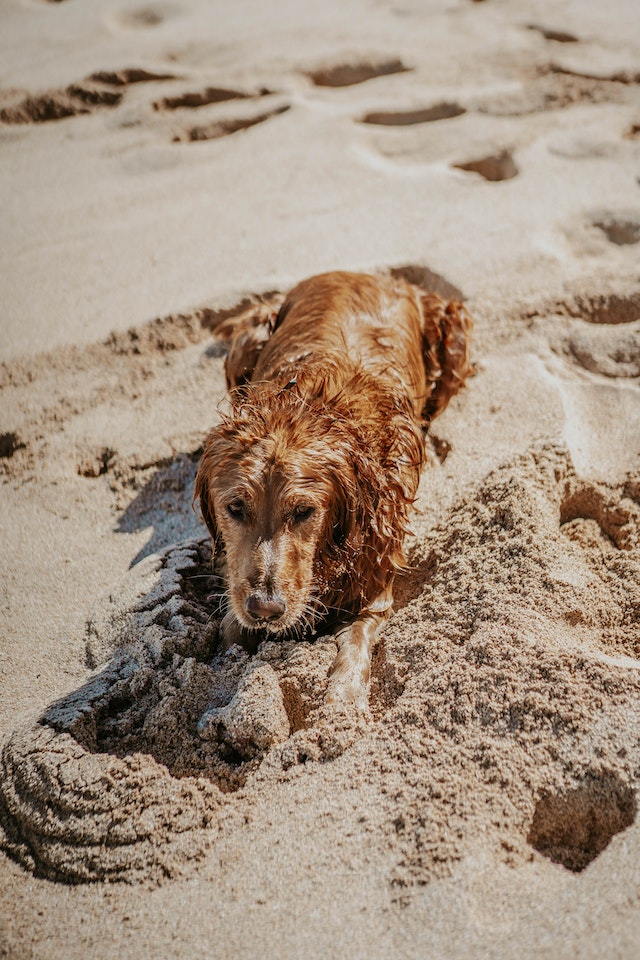

 Back
Back
Why Is My Dog Digging?
Digging is as much a part of being a dog as barking or sniffing. Even if your dog isn’t outside creating divots in the earth, you may notice them “digging” the couch cushions before settling down for a nap. But, why do dogs dig?

Writer Animalia Team

As any pup lover can attest, dogs just love to dig. It’s an instinctive behavior that dates back to their wild ancestors. Certain types of Terrier were bred for especially avid digging, but all types of dogs are known to sink their paws into the dirt.
While digging is entirely natural dogs most definitely enjoy it, it can become a behavioral issue when dogs dig excessively or inappropriately. Digging could damage your yard or help a dog to escape under a fence. Owners can’t eradicate digging altogether, but they can learn to control it and ensure it nevers puts their dog or their home at risk.
Why do dogs dig?
Digging is as much a part of being a dog as barking or sniffing. Even if your dog isn’t outside creating divots in the earth, you may notice them “digging” the couch cushions before settling down for a nap. But, why do dogs dig? There are a number of explanations for this ubiquitous habit:
- Mimicking their ancestors: Digging is an instinct that dogs inherited from their wild ancestors. Every type of dog exhibits the behavior to at least some extent.
- Hunting for prey: If your dog is especially dedicated to digging, it’s possible you’ve got moles or other pests hiding under your lawn. Even if you can’t detect them, your dog may smell or hear them and make a valiant effort to dig them up. Some dogs naturally dig for prey whether it’s there or not. The word “Terrier” literally means “Earth Dog” and that explains why the various breeds of Terrier love to dig.
- Keeping cool: Dogs may dig shallow beds into cool soil on very hot days. Thick-coated breeds such as the Alaskan Malamute or Siberian Husky do this often when they’re living in warmer climates.
- Making a den: When a dog is pregnant, she often feels an instinctual urge to make a den as delivery approaches.
- Burying food: This is another motivation for digging related to ancient instincts. Before dogs were domesticated, meals came far less regularly. A wild canine may have buried a hidden cache of food for consumption later on. While domestic dogs don’t need to bury food for sustenance, they still enjoy burying bones to enjoy days or weeks down the road. Don’t be surprised if your dog forgets where they hid their bone and needs to dig one or several holes to find it.
- Escape: As a result of boredom or desire for a mate, a dog may try and dig their way to escape. A dog with separation anxiety may try to dig their way back to their owner.
- Boredom: A dog left to its own devices without toys or companions to keep it busy, may dig simply to keep entertained.
- It’s fun: Some dogs, even if they’re surrounded by toys, simply can’t get enough of digging.

How to stop your dog from digging
It’s important to remember that a dog is a dog. You can’t attempt to humanize them and totally eliminate the desire to dig. Such attempts are inherently cruel and could prove distressing for pets. It is, however, possible to reduce the urge to dig and minimize the damage it causes. First, owners need to understand the root cause of their dog’s behavior.
Manage boredom
If your dog is digging out of boredom, it’s a sign they could use more mental stimulation. Try making your backyard more entertaining with puzzle toys containing treats. If you catch your dog mid-dig, try to redirect their attention with treats or different activities. Throw a ball or practice a trick, taking care to offer plenty of praise. Remember not to leave dogs on their own outdoors for too long. Too much solitude could mean plenty of time with nothing to do but dig.
Get more exercise
Simply increasing your pet’s exercise level may provide the solution you’re looking for. A tired dog is probably more likely to sleep than to dig. Daily walks along with plenty of active play including games of tug of war and hide and seek will provide great bonding opportunities while tiring your puppy out. Try building an obstacle course and training your dog to use it. It’s a good source of exercise for you at the same time. If you’ve got the pet care budget to spare, you could even invest in a treadmill designed for dogs!
Use deterrents
If your dog is digging up your lawn in search of prey or just for fun, sprinkling or spraying a deterrent could be the answer. There are plenty of non-toxic but unpleasant options for discouraging destructive behaviors like chewing and digging. Look for some next time you hit the pet store.
Underground fencing
If your dog continuously digs around your perimeter fencing in an attempt to escape, consider investing in some underground fencing. Burying wire fencing under vulnerable areas of your yard will make it much harder for dogs to dig deep enough to escape. Hopefully, they’ll soon give up on their attempts to make a break for it. It’s best to combine this strategy with an attempt to alleviate boredom that might inspire digging.
Pest control
If you have reason to believe your dog is digging to get at moles or other vermin under your lawn, the best solution is to call in a pest control company.
Encourage appropriate digging
If the above solutions don’t work, give in to your dog’s instincts and embrace their digging. Try creating a dedicated digging spot. A plant-less patch of earth or a large sandbox can be ideal for this. Fill it with buried toys and rubber bones (changing them regularly for variety) and let your dog dig and explore to its heart’s content. Should they start digging elsewhere, gently redirect them to the appropriate digging spot.
Organized digging
If your dog can’t get enough digging, read up on events that will allow them to dig in an organized setting. The American Kennel Club’s Earthdog events, for example, allow Dachshunds and small Terriers to dig and burrow safely in search of prey. AKC Scent Work and agility classes are other alternatives. AKC Scent Work lets all breeds of dogs search for hidden target odors while agility classes provide the mental and physical stimulation of obstacle courses. These tire out your dog and stave off boredom while letting you enjoy a fun bonding experience. Best of all, your dog will probably be much too tired for digging once you’re back at home.





We offer the most comprehensive coverage
out there
Having Animalia is like a top-of-the-line
Rolls-Royce with a swimming
pool in the trunk.



Get your pet insurance quote
Is your pet a...
- Dog
- Cat
What is your pet's name?
Zip code




